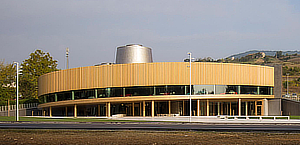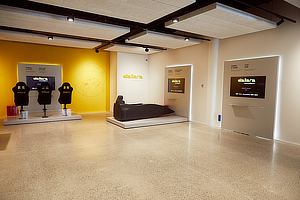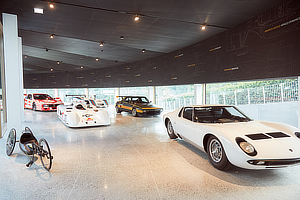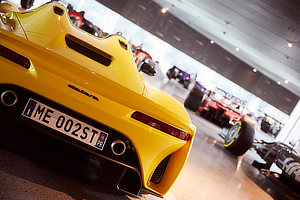 |
 |
 |
 |
 |
 |
| |
 |
|
 |
 |
 |
  |
  |
 |
 |
 |
 |
|
|
 |
|
 |
 |
 |
BUILDING |
 |
|
 |
|
 |
 |
 |
| |
 |
| 
 |
Dallara Academy
|
|
 |
 |
 |
 |
DESIGNER |
 |
|
|
 |
|
 |
 |
 |
| |
 |
|
 |
 |
 |
 |
CONTEXT |
 |
|
|
 |
|
 |
 |
 |
| Overview |
 |
|
 |
The sun dawns on a new building at the gates of Varano de' Melegari, between the slopes of the Apennines of Parma and the twisting ways of the river Ceno, which recalls a history of speed, passion and safety, and creates unexpected reflections and nuances.
|
|
 |
 |
 |
 |
 |
 |
 |
DESCRIPTION |
 |
|
|
 |
|
 |
 |
 |
| The main areas of the building |
 |
|
 |
 The Dallara Academy, commissioned by Mr. Giampaolo Dallara, consists of two floors connected by a large curved glazed ramp that can be walked on by visitors. On the ground floor there are the spaces dedicated to the reception of the public and the educational labs for schools; while the first floor houses the area dedicated to the university and the auditorium. The Dallara Academy, commissioned by Mr. Giampaolo Dallara, consists of two floors connected by a large curved glazed ramp that can be walked on by visitors. On the ground floor there are the spaces dedicated to the reception of the public and the educational labs for schools; while the first floor houses the area dedicated to the university and the auditorium. |
|
 |
 |
 |
|
 |
|
| Educational Labs |
 |
|
 |
 The Dallara Academy dedicates particular attention to the younger generation. In fact, an entire area at the ground floor is dedicated to educational labs designed for lower- and upper-middle school students, where they will be able to experience first hand the laws of physics that are applied in the design and development of racing cars.
The educational labs are based on the philosophy of "edutainment", that is, to learn while having fun, taking the students beyond the study of physics linked only to school experience and involve them directly in activities inspired by the three main skills that distinguish the company: the design and production with particular attention to the use of composite materials, aerodynamics and vehicle dynamics. |
|
 |
 |
 |
|
 |
|
| Exhibition Area |
 |
|
 |
 The exhibition area is a winding ramp that connects the two floors of the Dallara Academy. The exhibition area will be always open and available for guests, both single visitors and groups, with the chance to be accompanied by a Dallara guide. The ramp hosts the cars that have gone to make up the history of Mr. Dallara and then of the Dallara company: from the Miura to the SP 1000; from the racing cars that have competed at Le Mans and Daytona to the single-seater cars that were used to train almost all the Fl drivers and Indycar from American Championships; the latest Formula E; the Dallara Stradale. The visitors will immerse themselves in racing car and supercar history, never losing touch with the external environment, thanks to the glass wall that follows the winding ramp. The exhibition area is a winding ramp that connects the two floors of the Dallara Academy. The exhibition area will be always open and available for guests, both single visitors and groups, with the chance to be accompanied by a Dallara guide. The ramp hosts the cars that have gone to make up the history of Mr. Dallara and then of the Dallara company: from the Miura to the SP 1000; from the racing cars that have competed at Le Mans and Daytona to the single-seater cars that were used to train almost all the Fl drivers and Indycar from American Championships; the latest Formula E; the Dallara Stradale. The visitors will immerse themselves in racing car and supercar history, never losing touch with the external environment, thanks to the glass wall that follows the winding ramp. |
|
 |
 |
 |
|
 |
|
| University Area - MUNER |
 |
|
 |
| Dallara's commitment to educational activities continues with an area dedicated to university. The first floor of the Dallara Academy hosts the second year of a Masters Degree University course in "Racing Car Design" of MUNER. MUNER is an association, strongly endorsed by the Emilia-Romagna Region, between the Universities of the Emilia-Romagna and the most important motor companies that represent the world's top Italian automotive products, whose history is deeply rooted in the territory. |
|
 |
 |
 |
|
 |
|
| Auditorium |
 |
|
 |
| The Dallara Academy hosts an area designed to house conferences, meetings, presentations and team building activities. The Auditorium can host from 80 to 350 people thanks to its modular structure and it is characterized by a pronounced presence of technological elements, such as the 7mx2m videowall. |
|
 |
 |
 |
 |
 |
 |
 |
POINTS OF VIEW |
 |
|
|
 |
|
 |
 |
 |
| |
 |
 The arrival of autumn brings with it the beginnings of a new adventure for Dallara; the inauguration of the Dallara Academy, which embodies the vision of the founder and president of the company, Giampaolo Dallara: that of being able to share and transmit a story and a life dedicated to the passion of racing cars. "My intention and the aim of this Academy is to thank, by exhibiting our most significant cars, all the collaborators who have contributed to the company's reputation and growth. There is also a willingness to work with the Universities of MUNER for the training of tomorrow's engineers. But above all there is the desire to create a meeting place, a center of stimuli and interests alive and open for our valley and the community'.
The architect Alfonso Femia, Atelier(s) Alfonso Femia, who has been entrusted with the task of designing the building giving shape and matter to the thought of the Engineer Dallara, explains: "A complex that pays attention to the topography of the place, to its insertion in the landscape, to its double perception (from the outside and from the inside), and that has the will to be a place of research, of design, of meeting, of excellence ... a building fast and slow, silent and sound, technological and poetic ".
The Dallara Academy is a building that houses in itself different souls, who come to life in the different functions of the building: the link with the surrounding area, the importance of training, the transmission of passion "The idea that lives in the project is that to create a building able to reconcile the individual identity of the parts that contribute to create the whole, with a sense of unity of the whole, a landscape in the landscape"states Femia. |
|
 |
 |
 |
 |
VIDEO |
 |
|
|
 |
|
 |
 |
 |
| |
 |
|
 |
 |
 |
 |
LOCATION |
 |
|
|
 |
|
 |
 |
 |

|
 |

|
Continent |
|
 |
|
Nation |
|
 |
|
Region |
|
 |
|
Province |
|
 |
|
Town |
|
 |
|
|
|
 |
|
Website |
|
 |
|
 |
 |
 |
 |
MAP |
 |
|
|
 |
|
 |
 |
 |
| |
 |
|
 |
 |
 |
 |
|
TYPOLOGY |
 |
|
|
 |
|
 |
 |
 |
Main |
 |
|
 |
ARCHITECTURE | Museums and buildings for exhibitions
Specialized museums
Education buildings
Training centres and schools
Research buildings and centers
Research buildings
| |
|
|
 |
|
Additional |
 |
|
 |
ARCHITECTURE | Buildings for cultural activities
Conference halls
Education buildings
Universities, colleges
Other education centres
| |
 |
 |
 |
 |
CHRONOLOGY |
 |
|
|
 |
|
 |
 |
 |
Project |
 |
|
 |
| 
 |
2015
|
|
Realisation |
 |
|
 |
| 
 |
2017 - 2018 |
|
 |
 |
 |
 |
BIBILIOGRAPHIC REFERENCES |
 |
|
|
 |
|
 |
 |
 |
|
 |
Andrea Cordovani, "Academy il sogno è realtà", Autosprint 39/2018, 25 settembre 2018, "L'altra storia" pp. 38-42
Alberto Sabbatini, "Academy come e perché", Autosprint 39/2018, 25 settembre 2018, "L'altra storia" pp. 44-45 |
|
 |
 |
 |
 |
 |
 |
 |
ADDITIONS AND DIGRESSIONS |
 |
|
|
 |
|
 |
 |
 |
| |
 |
|
Dallara was founded by its current president, Giampaolo Dallara in 1972. After working for Ferrari, Maserati, Lamborghini, and De Tomaso, Dallara wanted to continue pursuing his dream of working in the world of racecars. He established "Dallara Automobili da Competizione" in his hometown of Varano de Melegari, Parma.
Since its establishment, Dallara has become world renowned for its specialty in designing, manufacturing, and developing racecars. The company's success can be credited to its achievements in Formula 3, first in Italy then around the world, its acclaim with American IndyCars, its consultancy for major manufacturers, and its continued focus on technology and innovation. Dallara prides itself in searching for the highest standards of quality, performance, safety, and customer support. Dallara's core competencies include: design and production with a specific focus on the use of carbon fiber composite materials; aerodynamics by means of wind tunnel and CFD; vehicle dynamics through simulations and testing; and the fast and flexible production of high quality prototypes.
Every weekend, approximately 300 Dallara cars run on tracks around the world in various formulas. The company is present in all Formula 3 championships, and is the sole supplier of cars for IndyCar, Indy Lights, GP2, GP3, Formula 3.5 V8, Super Formula and Renault Sport Trophy. Dallara also makes cars for instructional leagues such as the Formulino, for the Formula E championship, for WEC, ELMS and IMSA. In recent years, the engineering activities have expanded, both for racecars and for high-performance road cars. Dallara provides consultancy services to some of the world's most important international car companies including Alfa Romeo, Audi, Bugatti, Ferrari, KTM, Lamborghini, Maserati and many others that cannot be mentioned due to confidentiality agreements.
From 2007, Mr. Giampaolo Dallara is supported by Mr. Andrea Pontremoli who, after leaving the office of President and Chief Executive Officer of IBM Italy, became partner and has been appointed as the CEO of the company.
In 2012, the Dallara Indy Car Factory opened in Indianapolis, and it is responsible for the service, production and distribution of spare parts for Dallara racecars in the American championships, as well as for the design and manufacturing of components for the aerospace sector. It is also the main office of an "Edutainment" project in collaboration with the Purdue University in Indiana to promote interest in science and technology.
In 2014, the Dallara Group acquired Camattini Meccanica; which is a company specialized in carbon fiber composite materials with headquarters in Collecchio (Parma).
2016 saw the realization of a new research centre for composite materials, called DARC (Dallara Advanced Composite Research Center) in Varano de' Melegari.
In 2017, in the same building where Mr. Dallara started his business activity in Varano de' Melegari, the "Fabbrica Dallara" was inaugurated for the assembly and servicing of the "Dallara Stradale" cars.
GIAMPAOLO DALLARA
Giampaolo Dallara was born the 16th November 1936, in Varano de' Melegari, Parma.
After attending the high school in Parma, Giampaolo Dallara enrolled in the Faculty of Aeronautical Engineering at the Politecnico di Milano and graduated in 1959. That same year, he entered Ferrari with an assistant role alongside Carlo Chiti, who was the Racing Department Technical Director of the Scuderia.
After gaining two years of experience at the Prancing Horse with both the Formula 1 single-seaters and closed-wheels racecars (sports prototypes and Touring Cars), the young engineer switched to Maserati, where he would spend another two years. Similar to his role at Ferrari, Dallara assisted the Racing Deptartment Technical Manager, Giulio Alfieri.
In 1963 Giampaolo moved to Lamborghini, where he stayed for six years. He was the first Lamborghini Technical Director. Under his direction, in 1966 a team of engineers conceived and designed one of the most beautiful and admired "Gran Turismo" of all time: the Miura. He was then entrusted with the design and development of other important cars, like the 350 GT and the Espada.
In 1969 Giampaolo moved at De Tomaso, where he designed an innovative aeronautical-inspired F2 car, featuring a tubular monocoque chassis in riveted sheet metal, with a high torsional stiffness. This car performed extremely well in the European championship, where the De Tomaso outfit lined up drivers like Piers Courage and Jacky lckx under the direction of Frank Williams. It inspired the second Fl car designed by the young engineer, the De Tomaso-Ford 505/38.
In 1972, Giampaolo started his own company, Dallara Automobili da Competizione. |
|
 |
 |
 |
 |
 |
 |
 |
CLIENT |
 |
|
|
 |
|
 |
 |
 |
| |
 |
|
 |
 |
 |
 |
DIMENSIONAL
DATA |
 |
|
|
 |
|
 |
 |
 |
| Surface |
 |
|
 |
|
| Volume |
 |
|
 |
|
| Floors |
 |
|
 |
|
| Capacity |
 |
|
 |
|
 |
 |
 |
 |
STRUCTURES |
 |
|
|
 |
|
 |
 |
 |
| |
 |
|
 |
 |
 |
 |
STAFF |
 |
|
|
 |
|
 |
 |
 |
Project  |
 |
| Atelier(s) Alfonso Femia AF517 |
|
|
 |
|
|
 |
|
Project architect |
 |
|
Project leader |
 |
|
Design team |
 |
| Paolo Bertagna, Samuele Bianchi, Mirko Scaburri |
|
Coordination |
 |
|
Museum project |
 |
Atelier(s) Alfonso Femia
Studio Tapiro |
|
Interior design |
 |
|
BIM consultant |
 |
|
Lighting engineer |
 |
Alfonso Femia AF*
Invisible Lab [Silvia Perego] |
|
Systems |
 |
| FOR Engineering Architecture |
|
Construction supervision |
 |
|
Client direction |
 |
|
Safety coordination |
 |
|
 |
 |
 |
 |
CREDITS |
 |
|
|
 |
|
 |
 |
 |
| |
 |
Photos © Dallara Automobili
Text edited by Dallara Automobili
Courtesy of Dallara Automobili
|
|
 |
  |
 |
|
|